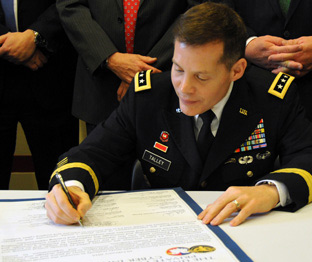Posted on February 20, 2015 by KC Gonzalez

Lt. Gen. Jeffrey Talley signs Army Reserve Cyber Private Public Partnership Program agreement
The initiative will produce highly qualified cyber warriors with advanced knowledge, mission-critical skills and military expertise, trained to protect and defend the nation from persistent threats, cyber terrorists and international criminal networks.
The U.S. Government Accountability Office estimates that the government alone needs 40,000 cybersecurity professionals to meet its current demands. The shortage of security professionals in business and industry exacerbates the need for security-related education and training programs.
“The demand for these cyber security professionals and cyber experienced soldiers far outpaces the current inventory,” said Lt. Gen. Jeffery Talley, chief of the U.S. Army Reserve and commanding general of the U.S. Army Reserve Command. “Each of these schools have been chosen for their excellence in cyber security research, teaching and their experience in helping the public and private sectors address cyber security shortages.”
Security is one of UTSA’s five core research strengths. The university offers top-tier academic programs in security through the College of Sciences, College of Business and College of Engineering and is home to the UTSA Institute for Cyber Security, UTSA Center for Infrastructure Assurance and Security and UTSA Center for Education and Research in Information and Infrastructure Assurance and Security.
“UTSA’s inclusion in Cyber P3 is a testament to the quality of our faculty, as well as to the sustained commitment of university partners and alumni who support our cyber security education and research programs,” said John H. Frederick, UTSA provost and vice president for academic affairs. “This initiative is a great example of how universities can work with the military and corporate partners to respond to the nation’s need for a highly skilled workforce.”
In 2014, UTSA’s cyber security program was ranked number one in the nation, according to a national survey of certified information technology professionals. The ranking, derived from a survey conducted by the Ponemon Institute for Hewlett-Packard, asked 2,000 certified UT professionals to rank the nation’s top cyber security programs from among a list of 403 educational institutions.
UTSA also holds three key designations from the National Security Agency and the Department of Homeland Security. It is a National Center of Academic Excellence in Information Assurance Education (CAE), a National Center of Academic Excellence in Information Assurance Research (CAE-R) and a National Center of Academic Excellence (CAE) in Information Assurance (IA)/Cyber Defense (CD). The latter is awarded to universities that are increasing the understanding of robust technologies, policies and practices through research to enable the U.S. to effectively prevent or respond to catastrophic cyber events.
In addition to its university partners, Cyber P3 includes a dozen employers from across the country including Rackspace, Chevron, Microsoft Corp., Verizon Communications and others.

